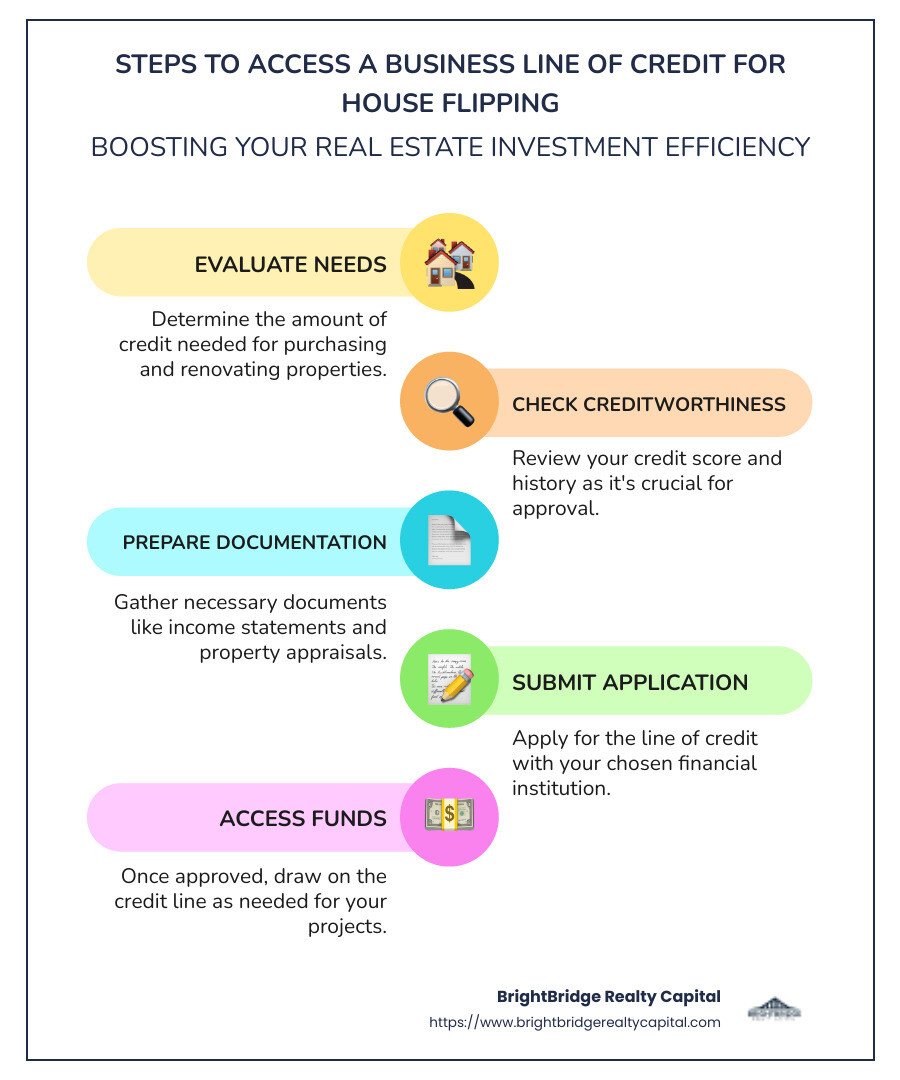Flip Finance: Your Guide to Business Lines of Credit

Business line of credit for house flipping is an essential tool for real estate investors aiming to flip houses swiftly and efficiently. This unique financing solution can provide the flexibility and financial support needed to purchase, renovate, and sell properties without the delays typical in traditional loan processes. In this rapidly evolving market where time and funding are crucial, it's a game-changer for investors.
To effectively use a business line of credit for house flipping:
- Flexibility: Tap into funds as needed during any phase of the project.
- Speed: Access money faster compared to traditional loans, making it ideal for time-sensitive deals.
- Budget Management: Pay interest only on what you use, keeping your project costs under control.
In today's real estate landscape, flipping houses requires not just skill and market knowledge, but also the right financial strategy. Investors face problems like rising renovation costs and high-interest rates, as noted by Rob Barber, CEO of ATTOM. Therefore, having a reliable credit source in place can differentiate a profitable flip from a costly endeavor.
A business line of credit stands out because of its versatility and accessibility, allowing investors to leverage opportunities and stay agile in a competitive market. Whether you're a seasoned flipper or new to the game, understanding and utilizing this credit option can be key to maximizing returns and minimizing risks.

Handy business line of credit for house flipping terms:
Understanding Business Lines of Credit for House Flipping
A business line of credit for house flipping can be a powerful tool in the arsenal of any real estate investor. It offers a revolving credit system that allows you to draw funds up to a certain credit limit, and only pay interest on what you use. This flexibility is crucial when dealing with the unpredictable nature of real estate projects.
Benefits of Using a Business Line of Credit
1. Flexible Financing:
One of the standout benefits of a business line of credit is its flexibility. Unlike traditional loans, you can access funds as needed, whether you're purchasing an investment property or covering unexpected renovation costs. This adaptability is especially beneficial in house flipping, where expenses can vary significantly from one project to another.
2. Cost Efficiency:
With a line of credit, you only pay interest on the amount you borrow. This can result in lower overall costs compared to fixed-term loans, where you pay interest on the full loan amount regardless of usage. This feature makes it a cost-effective choice for managing your project budget efficiently.
3. Quick Access to Funds:
In the world of real estate, timing is everything. A business line of credit allows for rapid access to funds, enabling you to seize opportunities as they arise. Whether it's a new property deal or an urgent repair, having quick financial backing can make all the difference.
Risks and Considerations
1. Creditworthiness:
Lenders will assess your creditworthiness before granting a line of credit. This includes reviewing your credit score, financial history, and the viability of your investment properties. A strong credit profile is essential to secure favorable terms and interest rates.
2. Equity Requirement:
Some lines of credit may require collateral, such as property equity, to secure the loan. This can pose a risk if the market shifts or if your project doesn't go as planned, potentially putting your assets at stake.
3. Revolving Credit Management:
While the revolving nature of a line of credit offers flexibility, it also requires disciplined financial management. It's easy to overextend and find oneself facing high-interest payments if not managed properly. Keeping track of your withdrawals and maintaining a healthy cash flow is crucial.
In summary, a business line of credit can provide the flexibility and cost efficiency needed to steer the complex world of house flipping. However, understand the risks involved and ensure that your financial health is robust enough to handle the responsibilities that come with this financing option. By doing so, you can leverage this tool to maximize your investment potential effectively.
Next, we'll explore the different types of business lines of credit available and how they can be custom to fit various investment strategies.
Types of Business Lines of Credit
When it comes to financing your house flipping projects, there are two main types of business lines of credit: Single Investment Property LOCs and Portfolio Lines of Credit. Each type has its own features and benefits, depending on your experience and the scale of your investment.
Single Investment Property LOCs
Single Property LOCs are designed for individual investment properties. These lines of credit are similar to a Home Equity Line of Credit (HELOC) and typically offer:
Interest-Only Draw Period: You can withdraw funds as needed during a 10-year interest-only draw period. This means you only pay interest on the amount you use, keeping costs down in the early stages of your project.
Repayment Period: After the draw period, you enter a 20-year repayment period where you pay back both principal and interest. This long-term structure can provide stability and predictability for your financial planning.
LTV (Loan-to-Value) Ratio: Single Property LOCs usually offer up to 60% LTV, allowing you to leverage the equity in your property effectively.
These LOCs are ideal for investors focusing on one property at a time, providing the flexibility and support needed for smaller-scale projects.
Portfolio Lines of Credit
For more experienced investors managing multiple properties, Portfolio Lines of Credit offer a broader financial solution:
Shorter Terms: These LOCs typically have terms of 18 to 24 months, making them suitable for quick turnaround projects. This shorter timeline aligns well with the nature of flipping multiple properties.
Higher LTV Ratios: With up to 75% LTV, portfolio LOCs allow you to leverage more of your property value, giving you increased purchasing power.
Credit Score Requirements: To qualify, you generally need a credit score of 700 or higher. This is because portfolio LOCs involve larger amounts, often exceeding $1 million, and are considered higher risk.
Experience Matters: Lenders prefer borrowers with a proven track record, often requiring at least 2-3 successful projects. This ensures that you have the experience necessary to manage the complexities of multiple property investments.
Portfolio LOCs are designed for seasoned investors who are ready to scale their operations and take on larger, more complex projects.
Both types of business lines of credit offer unique advantages custom to different investment strategies. Whether you're just starting with a single property or managing a diverse portfolio, understanding these options can help you choose the right financial tool to support your house flipping endeavors.

Next, we'll dig into the application process for securing a business line of credit, ensuring you're well-prepared to take the next step in your investment journey.
How to Apply for a Business Line of Credit for House Flipping
Applying for a business line of credit for house flipping might seem daunting, but it's straightforward with the right preparation. Here's a step-by-step guide to help you through the process.
Preparing Your Application
Gather Necessary Documentation: Before you start your application, you'll need to collect several key documents. These typically include:
Credit Score: A good credit score is crucial. Most lenders look for a minimum score of 680, though some may require higher, especially for larger credit lines.
Property Valuations: Have up-to-date valuations for the properties you plan to invest in. This helps lenders assess the potential value and risk of your investments.
Business Financials: Even if you're new to flipping, showing a solid business plan and any financial history can demonstrate your commitment and ability to manage funds.
Understand the Application Process: Many lenders offer online applications, which can be convenient and fast. However, be sure to carefully review the terms and conditions before submitting your application. Double-check that all your documentation is accurate and complete.
Prepare for a Credit Check: Lenders will perform a credit check as part of the application process. Ensure your credit report is accurate and address any discrepancies beforehand.
Application Review and Approval
Timeline: Once you've submitted your application, the review process typically begins. Lenders will examine your documentation and may request additional information if needed. Expect this phase to take a few weeks, although some lenders, like FundingPilot, offer pre-approval in as little as one business day.
Additional Documentation: During the review, be prepared to provide any extra documentation that the lender might request. This could include more detailed property appraisals or further financial records.
Approval Timeline: The entire approval process can take anywhere from a few weeks to up to 60 days, depending on the lender and the complexity of your application. Once approved, you'll receive confirmation and details about accessing your credit line.
By understanding these steps and preparing thoroughly, you can steer the application process smoothly and secure the funding you need for your house flipping projects. Next, we'll address some common questions about using a business line of credit for house flipping, ensuring you have all the information necessary to make informed decisions.
Frequently Asked Questions about Business Lines of Credit for House Flipping
What credit score is needed?
When applying for a business line of credit for house flipping, having a good credit score is essential. Most lenders prefer a minimum credit score of 680. However, for larger credit lines or more favorable terms, you might need a higher score. Your credit score reflects your creditworthiness and helps lenders assess the risk of lending to you.
If your score is below the required threshold, consider taking steps to improve it before applying. This could include paying down existing debts or correcting any errors on your credit report.
Can I use a line of credit for down payments?
Yes, you can use a business line of credit to cover down payments on investment properties. This can be a strategic way to leverage your available credit and maximize your buying power. By using a line of credit, you can secure properties without tying up your own funds, allowing for more flexibility in managing multiple projects.
However, it's important to manage this carefully. Using a line of credit for down payments means you'll need to repay the borrowed amount, along with any interest, so ensure your cash flow can support this.
How fast can I access funds?
One of the primary benefits of a business line of credit for house flipping is the speed at which you can access funds. Once your line of credit is approved, you can draw from it as needed, often with immediate access. This is particularly advantageous in the world of house flipping, where opportunities can arise quickly.
The initial approval process can take anywhere from a few weeks to up to 60 days, but once set up, you can enjoy fast closings and swift funding. This flexibility allows you to act quickly on deals and manage renovation costs efficiently, ensuring you stay competitive in the market.
By understanding these aspects of a business line of credit, you can better prepare to leverage this financial tool for your house flipping ventures.
Conclusion
At BrightBridge Realty Capital, we understand the unique needs of real estate investors, especially those involved in house flipping. Our customized financing solutions are designed to provide the flexibility and speed you need to succeed in this dynamic market.
Our business lines of credit for house flipping offer a seamless process that allows you to access funds quickly and efficiently. We know that in real estate, timing is everything. That's why we pride ourselves on fast closings—often within a week—so you can seize opportunities as they arise.
We cut out the middleman, providing direct lending with competitive rates and a hassle-free experience. Whether you're a seasoned investor or just starting, our team is dedicated to supporting your journey with custom solutions that fit your specific needs.
Explore how our financing options can help you achieve your investment goals by visiting our BrightBridge Realty Capital service page. Let us help you bridge the gap with smart real estate financing and keep your projects on track.


